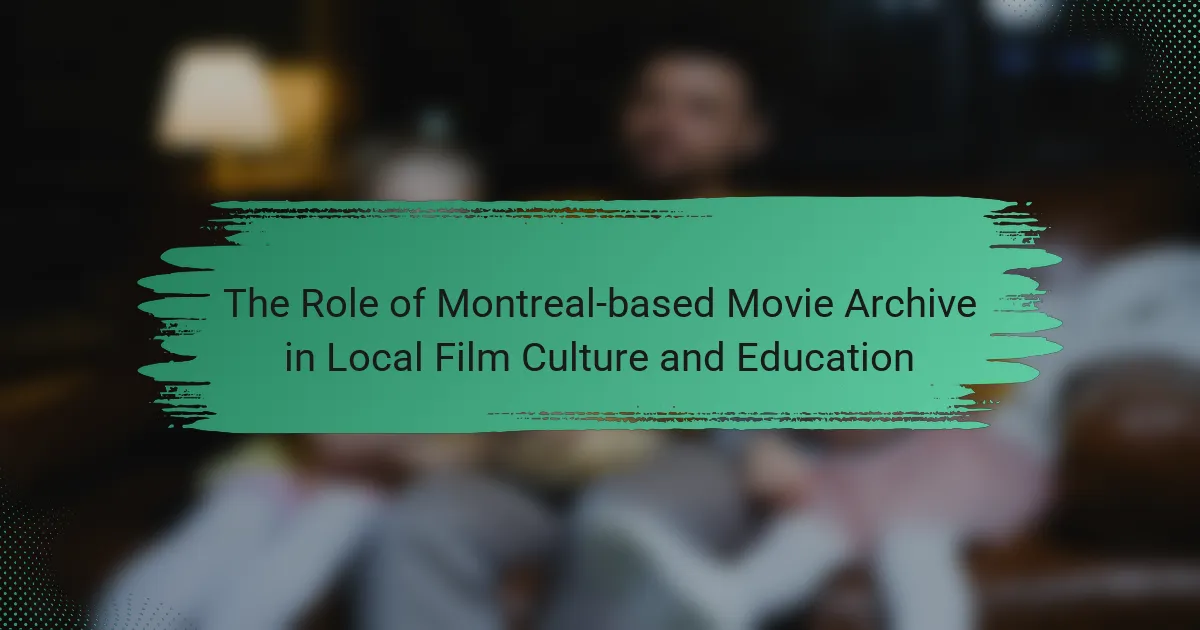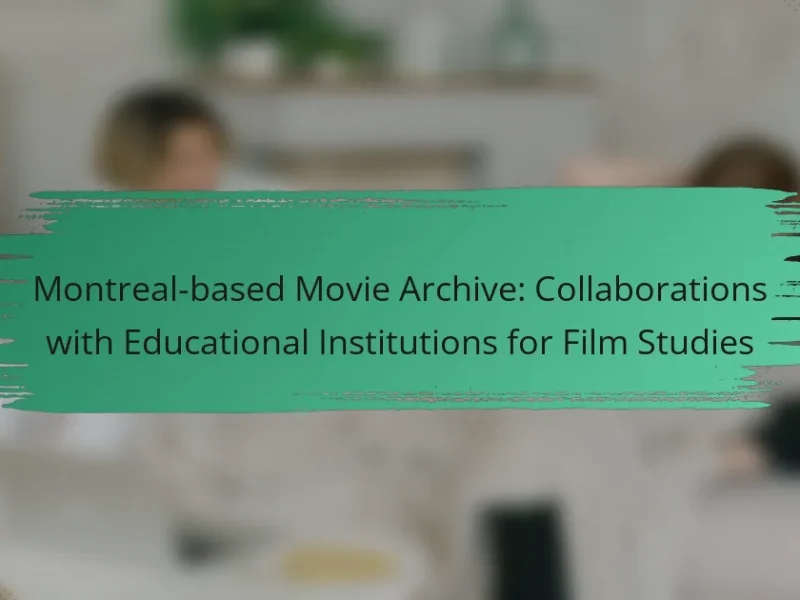Montreal-based movie archives are essential institutions that preserve and promote local film culture, housing diverse collections of Canadian and international films, documents, and artifacts. These archives ensure access to historically significant films, support research and education, and foster community engagement through screenings and exhibitions. Despite their vital role, they face challenges related to funding, preservation, and public awareness, which impact their effectiveness in maintaining film heritage. Collaborations with local filmmakers further enhance their contributions to Montreal’s unique storytelling traditions and cultural identity.

What is the role of Montreal-based movie archives in local film culture?
Montreal-based movie archives play a crucial role in preserving and promoting local film culture. They serve as repositories for Canadian cinematic history, housing a diverse collection of films, documents, and artifacts. These archives provide access to films that might otherwise be lost, ensuring that future generations can study and appreciate local cinema. They also support research and education, offering resources for filmmakers, students, and historians. Events such as screenings and exhibitions foster community engagement and appreciation for local filmmaking. Additionally, these archives contribute to the cultural identity of Montreal, showcasing its unique storytelling traditions. By collaborating with local filmmakers, they help to create a vibrant film community.
How do Montreal-based movie archives contribute to the preservation of local films?
Montreal-based movie archives play a crucial role in preserving local films. They collect, catalog, and store films produced in the region. This ensures that local cinematic heritage is maintained for future generations. Archives often restore and digitize films to prevent deterioration. They also provide access to researchers, filmmakers, and the public. This accessibility promotes education and appreciation of local cinema. Institutions like the Cinémathèque Québécoise actively engage in these preservation efforts. They house a vast collection of over 50,000 films, including many significant local works. Through these initiatives, Montreal’s film archives safeguard the cultural legacy of the region.
What specific films are archived and why are they significant?
The Montreal-based movie archive preserves several significant films including “Mon Oncle” and “The Decline of the American Empire.” “Mon Oncle,” directed by Jacques Tati, is significant for its innovative use of visual comedy and social commentary. It won the Academy Award for Best Foreign Language Film in 1959. “The Decline of the American Empire,” directed by Denys Arcand, is notable for its exploration of contemporary relationships and philosophical discussions. It received an Academy Award nomination for Best Foreign Language Film in 1987. These films are archived to ensure their cultural, historical, and artistic value is recognized and accessible for future generations.
How does the preservation process work in these archives?
The preservation process in these archives involves systematic methods to maintain and protect film materials. Archives utilize climate-controlled environments to prevent deterioration. They digitize films to create accessible copies while preserving the original formats. Regular inspections of physical media are conducted to identify any signs of damage. Restoration techniques are applied to repair and stabilize films when necessary. Professional archivists follow established guidelines for preservation practices. These methods ensure the longevity of film collections for future generations.
Why are Montreal-based movie archives important for film education?
Montreal-based movie archives are vital for film education because they preserve historical film artifacts. These archives provide access to a diverse range of films that reflect local culture and history. They serve as resources for students and educators, offering materials for research and analysis. The archives also host screenings and workshops that enhance learning experiences. They contribute to the understanding of film as an art form and cultural expression. Access to these archives fosters critical thinking and appreciation among students. Montreal’s film history is rich, and these archives play a key role in documenting it. This accessibility supports the development of future filmmakers and scholars in the region.
What educational programs do these archives offer?
Montreal-based movie archives offer various educational programs focused on film culture and history. These programs include workshops on film preservation techniques. They also provide seminars discussing the impact of cinema on society. Educational screenings are organized to showcase classic and contemporary films. Additionally, archives collaborate with local schools for tailored educational initiatives. These initiatives aim to enhance film literacy among students. Furthermore, public lectures feature industry professionals sharing insights on filmmaking. Each program is designed to engage the community and promote appreciation for film.
How do these programs enhance the understanding of film among students?
These programs enhance the understanding of film among students by providing access to diverse film archives. They facilitate hands-on experience with film analysis and production. Students engage with historical and contemporary films, fostering critical thinking. Workshops and screenings promote discussions about cinematic techniques and storytelling. Research shows that exposure to various film genres improves analytical skills. Programs often include guest lectures from industry professionals, offering real-world insights. This combination of resources and experiences deepens students’ appreciation of film as an art form.
How do Montreal-based movie archives engage with the local community?
Montreal-based movie archives engage with the local community through various programs and initiatives. They host film screenings that showcase local filmmakers and historical films relevant to the region. These screenings often include discussions or Q&A sessions with filmmakers, fostering dialogue and community involvement. Archives also collaborate with educational institutions to provide resources for film studies. Workshops and seminars are organized to teach filmmaking techniques and film preservation. Additionally, they offer access to their collections for research and public viewing, enhancing cultural awareness. Events like film festivals further connect the archives with the community, celebrating local talent and film heritage. This engagement supports the growth of Montreal’s film culture and education.
What events or screenings are organized by these archives for the public?
Montreal-based movie archives organize a variety of public events and screenings. These events include film screenings, educational workshops, and panel discussions. Screenings often feature classic films, documentaries, and local productions. Workshops provide insights into film preservation and archiving techniques. Panel discussions typically involve filmmakers and industry experts. Archives also host festivals to celebrate local cinema. These initiatives promote film culture and education within the community. They aim to engage the public and foster appreciation for cinematic arts.
How do these community initiatives promote local filmmakers?
Community initiatives promote local filmmakers by providing platforms for showcasing their work. These initiatives often organize film festivals and screening events. Such events create visibility for local talent. They also facilitate networking opportunities among filmmakers and industry professionals. Workshops and mentorship programs are frequently offered. These programs enhance skills and knowledge in filmmaking. Funding and grant opportunities may be available through these initiatives. This financial support helps filmmakers bring their projects to fruition. Overall, community initiatives play a crucial role in fostering a vibrant local film culture.

What unique attributes define Montreal-based movie archives?
Montreal-based movie archives are characterized by their extensive collections of Canadian and international films. These archives often focus on preserving local cinema history. They provide unique access to rare and historically significant films. Many archives offer educational programs that promote film literacy. They also host screenings and community events to engage the public. Some archives specialize in specific genres or themes relevant to Montreal’s cultural landscape. Furthermore, collaborations with local filmmakers enhance their role in the community. This combination of preservation, education, and community engagement defines their unique attributes.
What types of collections are housed within these archives?
Montreal-based movie archives house various types of collections. These include film collections, which consist of both feature films and short films. Additionally, they contain documentary collections that focus on local history and culture. Archival materials such as scripts, photographs, and production notes are also included. Moreover, there are collections of promotional materials, like posters and press kits. These archives serve as a resource for researchers, educators, and filmmakers. They preserve the local film heritage and support educational initiatives. The diversity of collections reflects the rich film culture of Montreal.
How do these collections reflect the diversity of Montreal’s film history?
Montreal’s film collections showcase the city’s diverse film history through a wide range of genres and cultural perspectives. These collections include works in multiple languages, reflecting the city’s bilingual nature. They feature films from various cultural communities, such as French, English, and Indigenous filmmakers. The archives also preserve historical films that document significant social and political events in Montreal. Additionally, they highlight the contributions of women and minority filmmakers, emphasizing inclusivity in the film industry. The presence of avant-garde and experimental films further illustrates Montreal’s artistic innovation. Overall, these collections serve as a comprehensive representation of the city’s rich cinematic landscape.
What rare films or materials can be found in these archives?
Rare films and materials in these archives include early Canadian cinema, unique documentaries, and experimental films. Notable titles feature lost works from the 1920s and 1930s. The archive also houses rare interviews with influential filmmakers. Additionally, it contains original film prints and promotional materials. These items provide insight into the evolution of local film culture. The preservation of such materials is crucial for educational purposes. Access to these films supports research and cultural appreciation. The archives serve as a vital resource for film scholars and enthusiasts alike.
How do Montreal-based movie archives collaborate with other cultural institutions?
Montreal-based movie archives collaborate with other cultural institutions through joint projects and exhibitions. These collaborations often include sharing resources and expertise. For example, archives partner with museums to showcase film history. They also work with educational institutions to provide access to archival materials. This access enhances film studies programs. Additionally, archives engage in community outreach initiatives with local cultural organizations. These initiatives promote awareness of film heritage. The result is a richer cultural landscape in Montreal.
What partnerships exist between these archives and local universities?
Partnerships between Montreal-based movie archives and local universities include collaborative research initiatives and educational programs. These partnerships often facilitate access to archival materials for university students and faculty. For instance, universities may incorporate archival content into film studies curricula. Additionally, joint events such as workshops and seminars are frequently organized. These events aim to enhance the understanding of film history and preservation techniques. Some archives also provide internships for students, offering hands-on experience in archival work. This collaboration enriches both the academic environment and the preservation efforts of local film culture.
How do these collaborations enhance film culture in Montreal?
Collaborations enhance film culture in Montreal by fostering community engagement and creative exchange. These partnerships connect filmmakers, educators, and institutions. They facilitate access to diverse resources and expertise. Local archives provide historical context and preservation of cinematic heritage. Events and workshops promote skills development and networking opportunities. Collaborative projects often showcase local talent and stories. This enriches the cultural landscape and encourages audience participation. The result is a vibrant film scene that reflects Montreal’s unique identity.

What challenges do Montreal-based movie archives face?
Montreal-based movie archives face significant challenges related to funding and preservation. Many archives operate on limited budgets, impacting their ability to acquire new materials. The cost of digitizing and maintaining film collections is high. Additionally, the threat of physical deterioration of films poses a risk to their longevity. Technological advancements require constant updates to preservation techniques. There is also a lack of public awareness about the importance of these archives. This results in lower engagement and support from the community. Furthermore, competition for resources among cultural institutions complicates their operational landscape. These factors collectively hinder the effectiveness of Montreal-based movie archives in preserving film heritage.
How do funding issues impact the operations of these archives?
Funding issues significantly hinder the operations of archives. Limited financial resources restrict their ability to acquire new materials. This affects the preservation of existing collections, as maintenance costs may exceed available budgets. Staff layoffs often occur due to budget constraints, leading to reduced expertise and support. Additionally, funding shortages can limit public access to archives and educational programs. Archives may struggle to host events or exhibitions without adequate financial backing. Consequently, the overall mission of preserving and promoting local film culture suffers. Historical data indicates that many archives have closed or reduced services due to prolonged funding challenges.
What strategies are being implemented to overcome financial obstacles?
Montreal-based movie archives are implementing various strategies to overcome financial obstacles. They are seeking grants from government and private foundations to secure funding. Collaborations with educational institutions enhance resource sharing and reduce costs. Community outreach programs are being developed to increase local engagement and support. Fundraising events are organized to generate additional revenue. Partnerships with local businesses provide sponsorship opportunities. Digital initiatives are being launched to reach wider audiences and attract online donations. These strategies collectively aim to ensure the sustainability of the archives and their contributions to local film culture and education.
How do technological advancements affect the preservation of films?
Technological advancements significantly enhance the preservation of films. Digital restoration techniques allow for the repair of damaged film elements. These techniques include scanning films at high resolutions. This process captures details that may be lost in traditional methods. Advanced software can remove artifacts and restore color accuracy. Furthermore, digital storage solutions provide long-term protection against physical degradation. For example, the Library of Congress has implemented digital archiving methods to safeguard historical films. These advancements ensure that films remain accessible for future generations.
What future trends are emerging for Montreal-based movie archives?
Montreal-based movie archives are increasingly focusing on digital preservation and accessibility. This trend is driven by advancements in technology and a growing demand for online content. Archives are digitizing their collections to reach wider audiences. Enhanced metadata tagging is being implemented for better searchability. Collaborative projects with educational institutions are emerging to promote film education. Community engagement initiatives are also becoming more prevalent. These efforts aim to connect local filmmakers with historical resources. The integration of virtual reality experiences is being explored to immerse users in film history.
How is digital technology shaping the future of film archiving?
Digital technology is revolutionizing film archiving by enabling efficient storage, preservation, and access. Digital formats allow for high-quality reproduction of films without degradation. Advanced metadata systems enhance the organization and retrieval of archived content. Cloud storage solutions provide scalable and secure options for long-term preservation. Digital restoration techniques can repair and enhance older films, extending their lifespan. Furthermore, online platforms facilitate broader public access to archived films. The shift to digital has led to collaborative efforts among archives, increasing resource sharing and knowledge exchange. This transformation supports educational initiatives by making historical films more accessible to students and researchers.
What role will Montreal-based archives play in the global film preservation movement?
Montreal-based archives will serve as vital resources in the global film preservation movement. They will collect, restore, and maintain significant film works. These archives will also provide access to rare and culturally important films. By collaborating with international organizations, they will enhance global preservation efforts. Montreal’s unique cultural perspective will contribute to diverse film narratives. The archives will engage in educational programs to raise awareness about film heritage. They will also promote research on film history and preservation techniques. This multifaceted role will solidify Montreal’s position in the global film preservation landscape.
What practical tips can be offered to support Montreal-based movie archives?
Promote collaboration between local filmmakers and archives. This can enhance the preservation of regional film heritage. Organize community events that showcase archived films. Events can attract public interest and increase awareness. Provide educational programs in schools about film history. This can foster appreciation for local cinema among youth. Encourage donations of films and memorabilia from local creators. This enriches the archives’ collections and supports community involvement. Seek funding and grants specifically for archival projects. Financial support can help maintain and expand archival facilities. Establish partnerships with universities for research initiatives. Collaboration can lead to greater visibility and academic engagement.
How can individuals contribute to the preservation of local film culture?
Individuals can contribute to the preservation of local film culture by supporting local filmmakers and attending screenings. Engaging with independent films fosters a community around local cinema. Volunteering at film festivals helps promote local talent and heritage. Sharing local films on social media increases visibility and appreciation. Joining film clubs encourages discussion and education about local cinema. Donating to local film archives ensures the preservation of historical films. Participating in workshops supports skill development in the local film industry. Collectively, these actions strengthen the local film ecosystem and ensure its sustainability.
What resources are available for those interested in learning more about film archiving?
Resources for learning about film archiving include academic courses, online platforms, and professional organizations. Institutions like the University of Southern California offer specialized programs in film preservation. The Association of Moving Image Archivists provides workshops and resources for professionals. Online platforms like Coursera and edX feature courses on film archiving and preservation. Additionally, books such as “Film Preservation: Competing Definitions of Value, Use, and Practice” provide in-depth knowledge. The Library of Congress offers guidelines and resources for film preservation practices. These resources support individuals interested in the field of film archiving.
Montreal-based movie archives are essential entities in preserving and promoting local film culture and education. They house diverse collections of films, documents, and artifacts, ensuring access to significant works that reflect Montreal’s unique cinematic heritage. The archives support research and education through various programs, screenings, and community engagement initiatives, fostering appreciation for local filmmaking. Additionally, they face challenges such as funding limitations and preservation needs, while also adapting to technological advancements to enhance accessibility and sustainability in film archiving.


